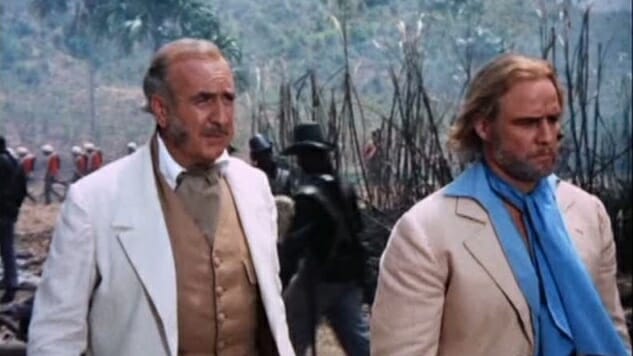In Burn!, Marlon Brando Is Capitalism’s Hitman
At 50, it’s still a stark portrait of a colonialist quagmire.

By time the Italian film production Burn! hit theaters in 1969, America had had its fill of Vietnam, but couldn’t truly leave. With vicious antipathy toward the war domestically and anemic recruitment among the armed forces, President Richard Nixon pursued a policy that came to be called “Vietnamization” of the war: shifting from an active role in troop commitments to a focus on training and equipping the South Vietnamese to fight off the Soviet-backed North Vietnamese. History will remember it as a moment when one of the world’s superpowers heaved a sigh and realized no amount of bombs were going to win the day.
Fifty years later, with our armed forces neck-deep in another failed land-grab and chocolate companies shrugging at their continued reliance on child slavery, it’s very hard to watch Burn!. It’s a movie where the villain grins with winning cheer, such that you almost root for him, even as the film slowly reveals more and more of his ghastly handiwork. It is a movie made at a time when Cold War proxy battles of the 20th century were destroying the Third World, which looks back at at a time when the avarice of the 19th century’s colonialist capitalism was destroying the Third World, and in which there are scenes that perfectly illustrate how we’re destroying the Third World today.

Walker: “A wife must be provided with food, with a home, with dresses, with medical attention, etc., etc. You’re obliged to keep her a whole lifetime even when she’s grown old and perhaps a trifle unproductive. With a prostitute on the other hand, it’s quite a different matter, isn’t it?”
Clad in light-colored linen and a jaunty hat, with an utterly unconcerned British drawl, Sir William Walker (Marlon Brando) arrives on the fictional island of Queimada in the Portuguese Antilles. The island’s name means “burnt,” because that’s how it ended up when the Portuguese brought it under their colonial thumb. Walker’s mission is simple, and his attitude toward it dispassionate and somewhat amused: The Portuguese rule the island’s sugar cane exports, and Great Britain would like cheaper sugar. With dry wit and casual charm, Walker goes about toppling the inconvenient Portuguese government and installing a puppet regime more amiable toward his own masters.
That involves putting a rifle in the hands of José Dolores (Evaristo Márquez) and filling him up with the rhetoric of revolution and independence. At no point during Walker’s sly manipulation of Dolores or the landed plantation owners does he seem the least bit concerned about anything he’s doing. His instructions to men on how to rob a bank, load a rifle, or, at one point, tie a fateful noose, seem like things he does on any day of the week. It’s no game to Dolores, though. At one point, Walker, secure in the knowledge that he’s inculcated in Dolores a sense of revolution, says to his young charge that it’s too bad they’ll need to leave a group of villagers to die. As Walker knows he will, Dolores decides to lead his people to freedom.
Then we see Walker in a room full of Queimada blue bloods poised to oust the government, explaining why they should allow Dolores to free the slaves: “Which is more important, and convenient? … A slave, or a paid worker?” he asks, in a movie made half a century before Sorry to Bother You.

